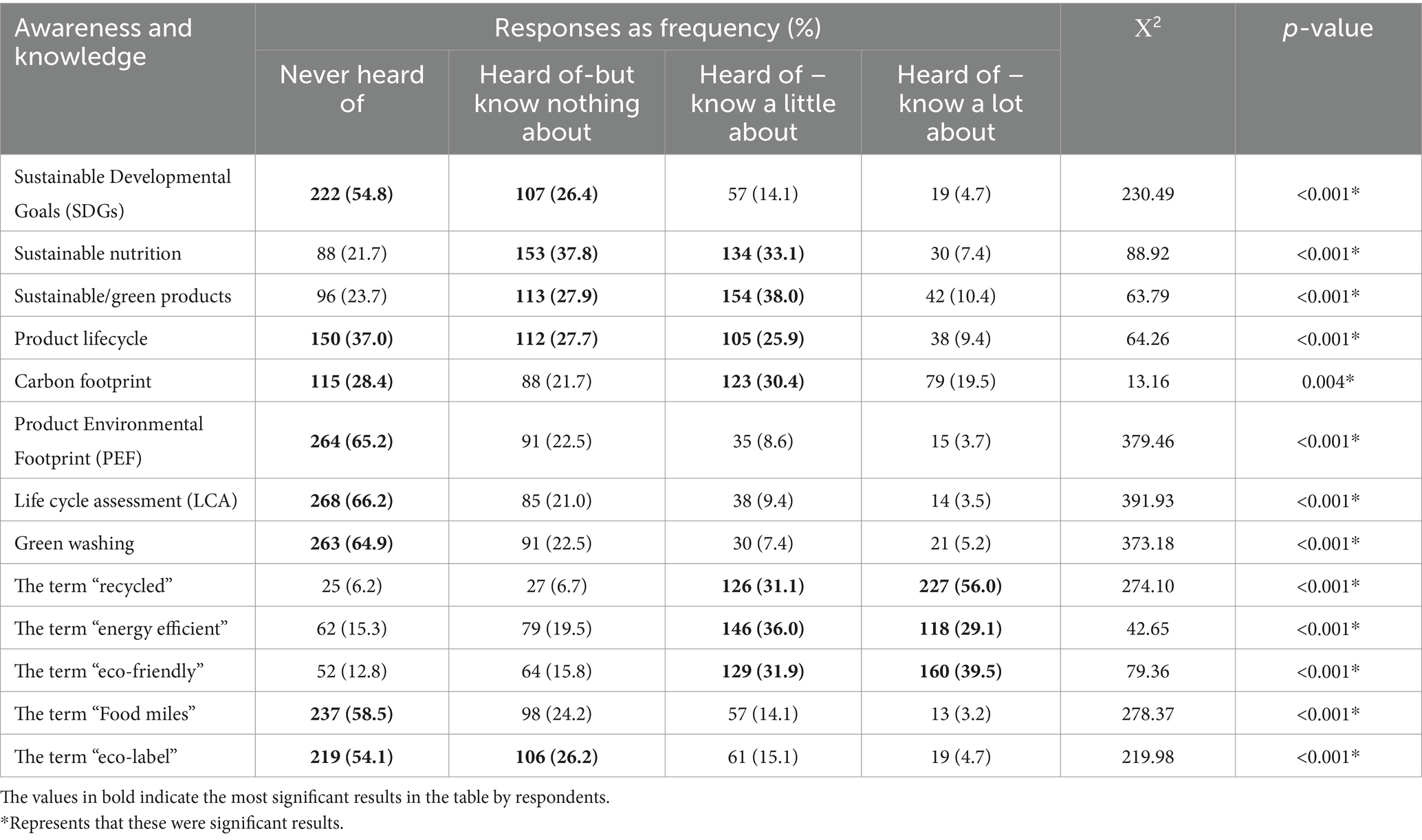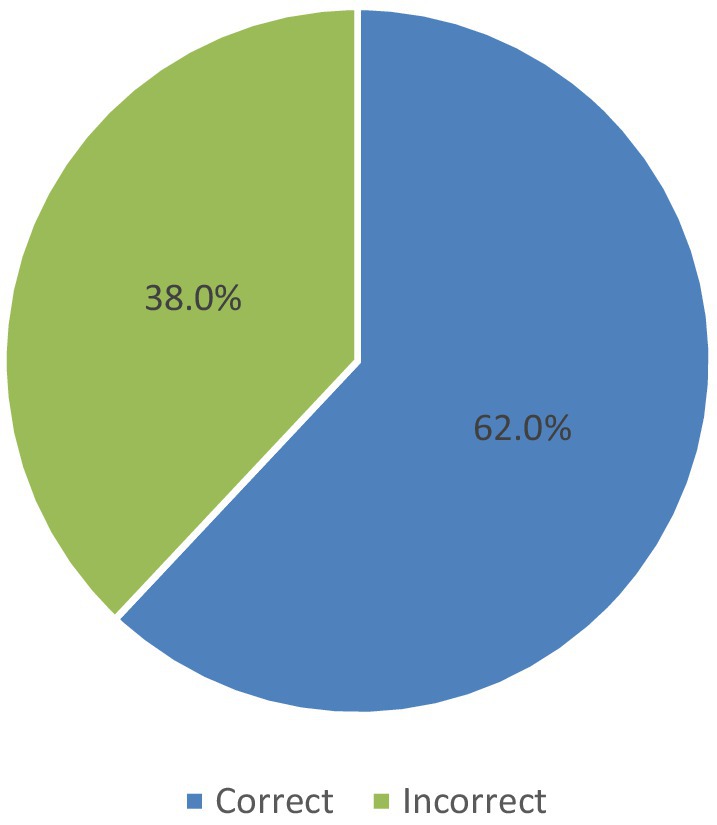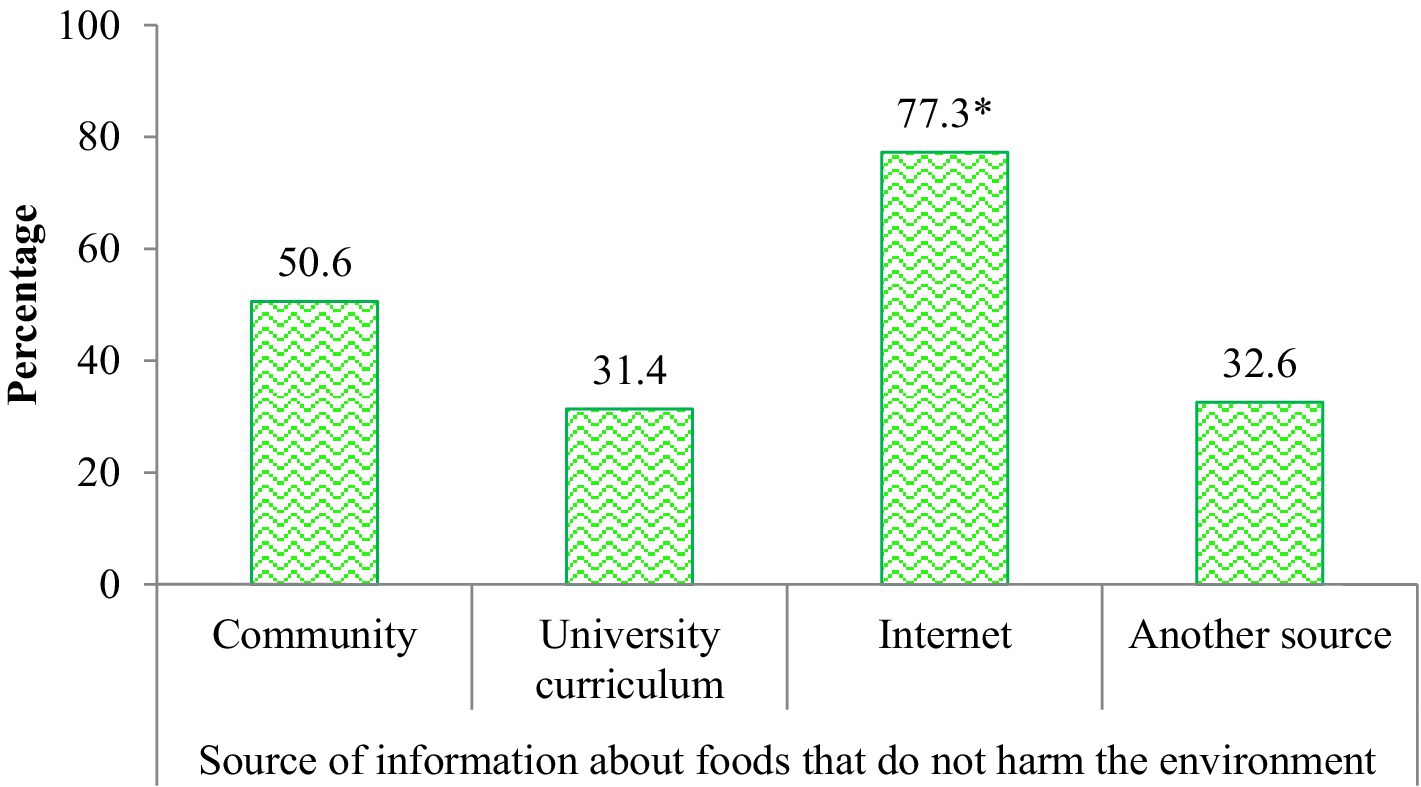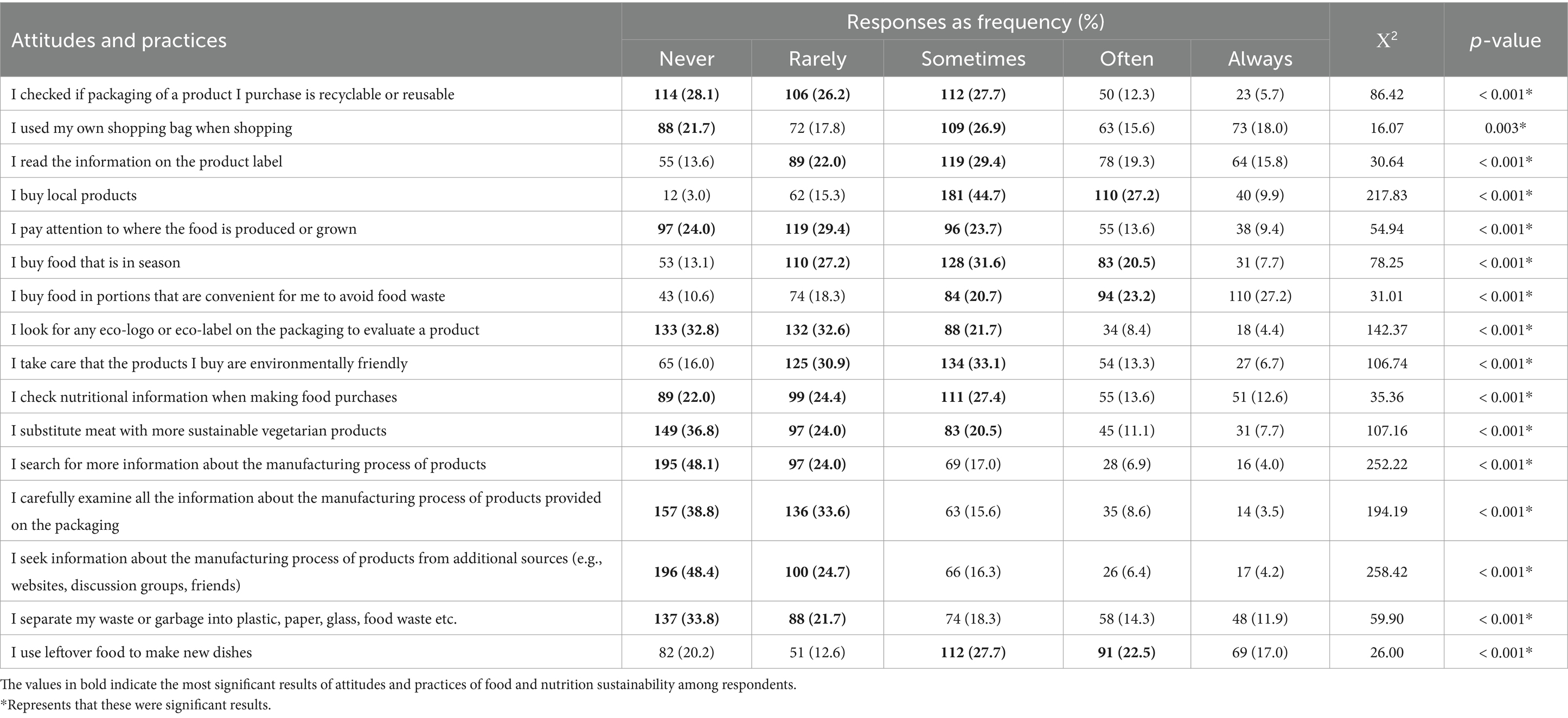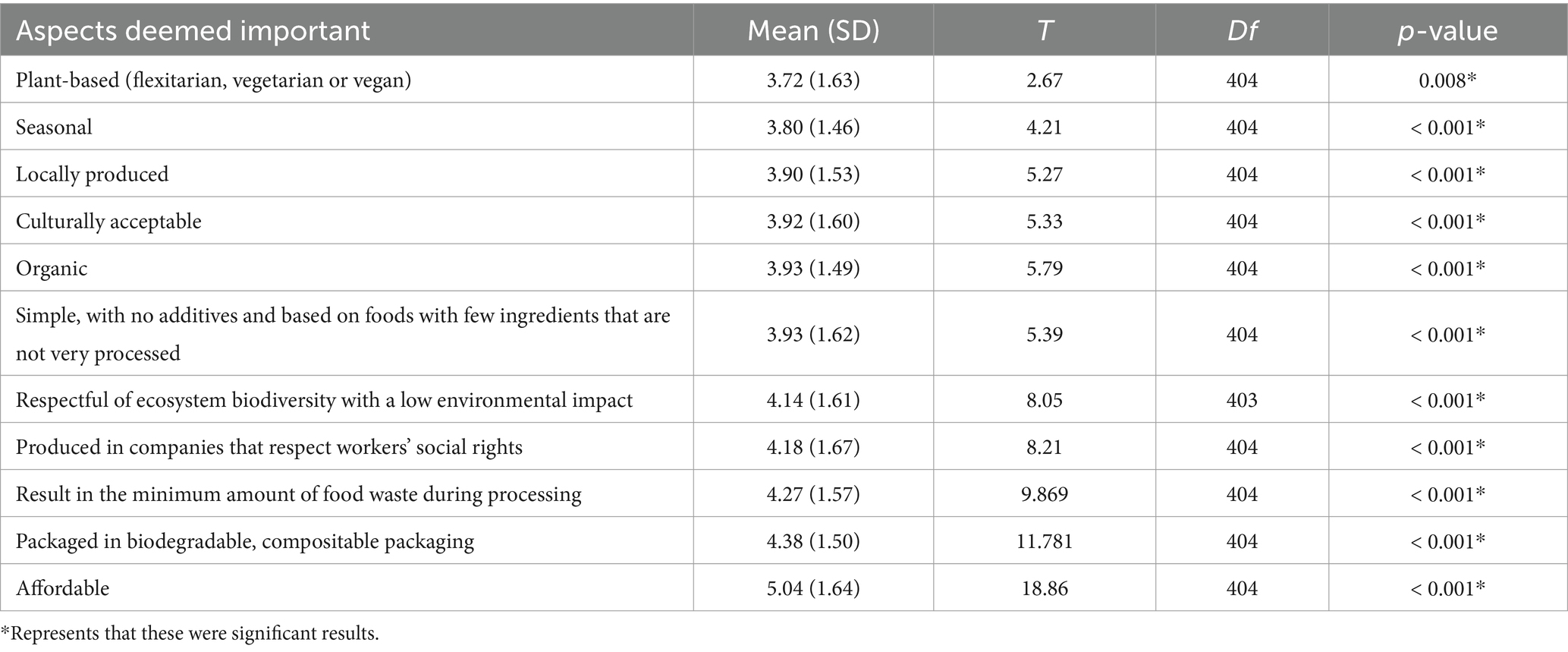- Department of Food and Nutrition Consumer Sciences, Durban University of Technology, Durban, South Africa
Food systems face increasing unsustainable consumption and production practices contributing to rising climate change and chronic diseases globally. However, promoting behavioral change depends on the awareness and knowledge required to influence food choice. Therefore, this study assessed awareness, knowledge and attitudes toward food and nutrition sustainability, and food choice drivers among students at the Durban University of Technology, South Africa. In this cross-sectional study, awareness, knowledge and attitudes toward food and nutrition sustainability, as well as food choice drivers, were assessed among 405 registered university students using a validated questionnaire. Respondents were conveniently selected at key hub areas at the university and recruited through informed consent. Data was analysed using descriptive statistics, chi-square goodness-of-fit-test and one-sample t-test. Out of 405 respondents, 62.0% were females, 54.8% were not familiar with Sustainable Development Goals (SDGs), while 45.2% had heard of them but lacked knowledge of what they meant. Significant proportions of students never heard of product environmental footprint (65.2%), life cycle assessment (66.2%), greenwashing (64.9%), and food miles (58.5%), p < 0.001. A significant 77.0% (n = 313, p < 0.001) of students relied on the internet as the primary source of information about foods that do not harm the environment. There was significant agreement that students knew what a healthy diet consisted of; they understood the impact of a diet on health, and they knew what a sustainable diet consisted of (p < 0.05). One of the food choice drivers that contributed to students being unable to have a healthy diet was difficulty in avoiding unhealthy food options, and the high cost of healthy food. Poor awareness of the SDGS among university students contributes to the prevalence of unsustainable and unhealthy food choices. This underscores the need for targeted educational interventions to bridge the knowledge gap and empower young adults to make informed and sustainable food choices. Food systems must also prioritise the production of healthy, cost-effective, and sustainable foods to facilitate better dietary practices.
1 Introduction
The prevalence of unsustainable food production practices and consumption patterns characterised by ultra-processed foods and high meat intake significantly threatens global food systems, planetary and human health. Approximately, one-third of the total anthropogenic greenhouse gas (GHG) emissions globally are attributed to food systems (Crippa et al., 2021). The existing food supply chain produces 13.7 billion metric tonnes of carbon dioxide equivalents (CO2eq), which accounts for 26% of all human-induced GHG emissions (Poore and Nemecek, 2018). These emissions are further influenced by factors such as food miles, which refer to the distance food travels from production or preparation sites to the point of consumption (Sirieix et al., 2008), and the often-overlooked environmental burden associated with each stage of food production. Tools like Life Cycle Assessment (LCA) are critical in evaluating the total environmental impact of a product from raw material extraction, through production and use, to waste management, offering a comprehensive view of sustainability (Curran, 2013). Not only does the production of ultra-processed foods affect the environment, but their consumption also increases the prevalence of overweight and obesity (Nwosu et al., 2022).
Moreover, the growing awareness of environmental issues has led to increased scrutiny of greenwashing, a term that merges ‘greenwash’ and ‘whitewash’ used by environmentalists to describe attempts by corporations to create a deceptively positive environmental image of practices that may, in fact, be harmful (Ruiz-Blanco et al., 2022). Consequently, anthropogenic emissions intensify climate change and its detrimental effects on human health and the physical environment, which escalate food insecurity (Ranganathan et al., 2018; Horn et al., 2022). Furthermore, the current practice of land utilisation is no longer a feasible strategy to adequately nourish the increasing human population, which is projected to be 9.6 billion individuals by the year 2050. Therefore, exploring more sustainable agricultural practices is imperative (Ranganathan et al., 2018). Recently, food sustainability has emerged as a prominent topic in modern food system discourse and a sustainable diet is considered a diet which contributes to food and nutrition security as well as a healthy life and is environment-friendly with low negative impacts for present and future generations (British Dietetic Association, 2022). To achieve this, the involvement of the consumers is required as an important driver of a sustainable food system.
The attainment of the SDGs by 2030 necessitates a concerted effort to diminish GHG emissions, contributing to a reduction in the global carbon footprint. In realising this goal [SDG 1 (No Poverty), SDG 2 (Zero Hunger), SDG 3 (Good Health and Well-being), SDG 12 (Responsible Consumption and Production) and SDG 13 (Climate Action)], consumer education targeted at the environmental implications of dietary selections and the consequent depletion of the earth’s natural resources are important (Dell’Anna et al., 2023).
The current unsustainable and unhealthy consumption and production practices challenge food systems. The food production and processing industry consumes considerable raw materials, energy, and water, concurrently generating a notable volume of environmental waste (Ahmad et al., 2019). Plant-based diets have recently been promoted as environment-friendly substitutes for animal-source foods. Plant-based diets have a reduced environmental impact than animal-sourced foods, which production contributes to land degradation, increased water consumption, elevated methane emissions, and a heightened risk of non-communicable diseases (Morganti et al., 2022). However, transition to this dietary pattern presents numerous challenges to age-long meat dietary patterns, especially within a young population and among the affluent.
While substantial research has explored consumer opinions and purchasing behaviors regarding sustainable foods (Petrescu et al., 2020), there remains limited focus on the experiences of university students. An Australian study examining the perceived importance and intended purchasing patterns of sustainable foods among university students found that students not only view sustainable foods as important but also demonstrated a clear link between their perceptions and purchasing behaviors. The study recommended implementing university-based strategies aligned with the SDGs, such as enhancing access to locally grown and sustainable foods on campus, primarily to support food-insecure students (Kent et al., 2021). However, research on South African university students’ perceptions of sustainability remains scarce.
This study aimed to address the following research questions:
What was the level of awareness, knowledge, and attitudes regarding food and nutrition sustainability among university students in South Africa?
What were the key determinants influencing food choices among this population?
In this study, it was hypothesised that higher levels of knowledge about food and nutrition sustainability would be positively associated with more favourable attitudes toward sustainable eating practices.
2 Methodology
2.1 Study design
A cross-sectional study was carried out among students of Durban University of Technology (DUT) in South Africa. The objective of this study was to determine awareness, knowledge, and attitudes toward food and nutrition sustainability, as well as food choice drivers among students at the Durban University of Technology, South Africa.
2.2 Study population and location
The inclusion criteria for this study required that all respondents be between 18 and 34 years old and registered as either undergraduate or postgraduate students. Respondents were selected from key hub areas, namely the Steve Biko Campus, Ritson Campus, and ML Sultan Campus. The study included both male and female students, and it included respondents from all ethnic backgrounds. Additionally, individuals of all abilities, including both abled and disabled persons, were included to ensure a diverse and representative sample. The exclusion criteria for this study comprised individuals younger than 18 or older than 34 years of age, all DUT staff, outsourced general workers, maintenance workers, and security guards.
Durban University of Technology is a multi-campus university in the province of KwaZulu-Natal, South Africa, focusing on higher education, technological training, research, and innovation. The DUT has six faculties (Accounting & Informatics, Applied Sciences, Arts and Design, Engineering and Built Environment, Health Sciences and Management Sciences) with a population of approximately 33,000 students (Mthembu, 2023). The three campuses where the study was conducted are located within 1 km of each other.
2.3 Sampling technique and sample size determination
According to Taherdoost (2017), a minimum sample size of 385 was calculated (with a 5% precision and 95% confidence interval) based on 17, 840, 000 youth population (18–34 years) in South Africa (Statistics South Africa, 2019). However, the number of students who eventually participated in the study was 405 students (251 females, 154 males) after meeting the eligibility criteria for the study.
2.4 Data collection instrument and procedure
A questionnaire was specifically designed for this study based on previous research regarding food and nutrition sustainability knowledge among university students (García-González et al., 2020; Stratton, 2021; Verain et al., 2021). The questionnaire was administered face-to-face to the respondents. The questionnaire included different main themes, including socio-demographic information, knowledge and awareness of food and nutrition sustainability terms (environmental impact, SDGs, carbon footprint, seasonal and local products, etc.), barriers and drivers of food choices (scored by average importance 1 = very unimportant to 6 = very important), and attitudes and practices towards sustainable nutrition and the environment. Data for the questionnaire was collected during the week for three consecutive months (August 2023, September 2023, and November 2023).
The principal researcher (S.S) recruited respondents at pivotal hub locations across all three campuses of DUT used for the study. The researcher played an important role in briefly explaining key concepts regarding food and nutrition sustainability from the questionnaire to create awareness and knowledge among the students. A stand was set up with a portable table and chair for the survey administration. The questions were mainly Likert-type or multiple-choice response options. Additionally, there were two open-ended questions: “What does sustainability mean to you?” and “What do you consider a healthy diet?”.
2.5 Data quality management
Before the survey, the reliability of the questionnaire was assessed through a pilot study involving a cohort of ten students randomly selected from the same study location; however, they were subsequently excluded from the main study. The questionnaire was prepared and distributed in English, the official language of communication at DUT, which all respondents understood. The findings of the pilot study informed the adjustment in the sections of the questionnaire used to collect data for the main study.
2.6 Data analysis
Data for the study were analysed using the IBM SPSS Statistics software version 29. Descriptive statistics such as frequency and percentage were used to summarise the data. Likert scale on attitude and practice towards sustainable nutrition and environment was dichotomised for further analysis. “No” represented the proportion of respondents who never had the attitude and practice, while “Yes” represented the proportion of respondents who had the attitude and performed the practice. A binomial test was performed for univariate, and chi-square goodness-of-fit was used to determine whether specific response options were selected significantly more or less frequently than others. Relationship among variables was determined by logistic regression at the 5% level of significance (p < 0.05).
2.7 Ethical considerations
Written informed consent was sought from individual respondents before participating in the study and after being provided with relevant information about what the study entailed. Respondents were informed about the nature and purpose of this research and were assured that their involvement was optional. They were also made aware of their right to withdraw from this study at any point without facing any negative consequences or penalties. This ethical consideration ensured that respondents maintained autonomy throughout the research process and contributed only if they were willing and comfortable to do so. Each respondent’s data was treated with a high level of confidentiality and stored for five years in sealed boxes in a secure room at the Department of Consumer Sciences: Food and Nutrition, and will be disposed of by shredding. All electronic datasets are password protected and will be disposed of permanently in any storage devices or applications after five years. Ethical approval for the study was obtained from the Institutional Research Ethics Committee (IREC) of the DUT with reference number 102/23.
3 Results
3.1 Socio-demographic characteristics of respondents
Information on the socio-demographic characteristics of respondents is presented in Table 1. Out of 405 respondents who participated in the survey, 62% were females, and 38% were males. The proportion of Black people (84.7%), Indian people (12.3%), coloured people (2.5%) and white people (0.5%) varied. Most respondents were young adults between 18 and 26 years old (98.3%), while 1.7% were between 27 and 34 years old. Most respondents who participated in this study were from the Ritson campus (39%), while 38 and 23% were from the Steve Biko and ML Sultan campuses, respectively.
Based on the faculty representation, Accounting and Informatics had the highest proportion (42%), followed by Applied Sciences (23.7%), Engineering and the Built Environment (15.1%), Management Sciences (14.6%), Health Sciences (3.0%) and Arts and Design (1.7%). Regarding academic year, 42% were first-year students, while 31.1, 20.7, 4.0 and 2.2% were second-year, third-year, fourth-year and postgraduate students, respectively.
3.2 Respondent’s awareness and knowledge of sustainable food and nutrition terms
The findings on awareness and knowledge of terms related to sustainable food and nutrition are presented in Tables 2, 3. It was observed that more than half of the respondents (especially 20.0% males, 34.8% females) had never heard of the SDGs before (54.8%, n = 222), while 45.2% (n = 183) had heard of them but were not familiar with the terms. Those who had heard of sustainable nutrition (14.6% males, 23.2% females), sustainable or green products (10.4% males, 17.5% females) and product lifecycle (11.9% males, 15.8% females) knew a lot about what such terms were 37.8% (n = 153), 27.9% (n = 113) and 27.7% (n = 112), respectively.
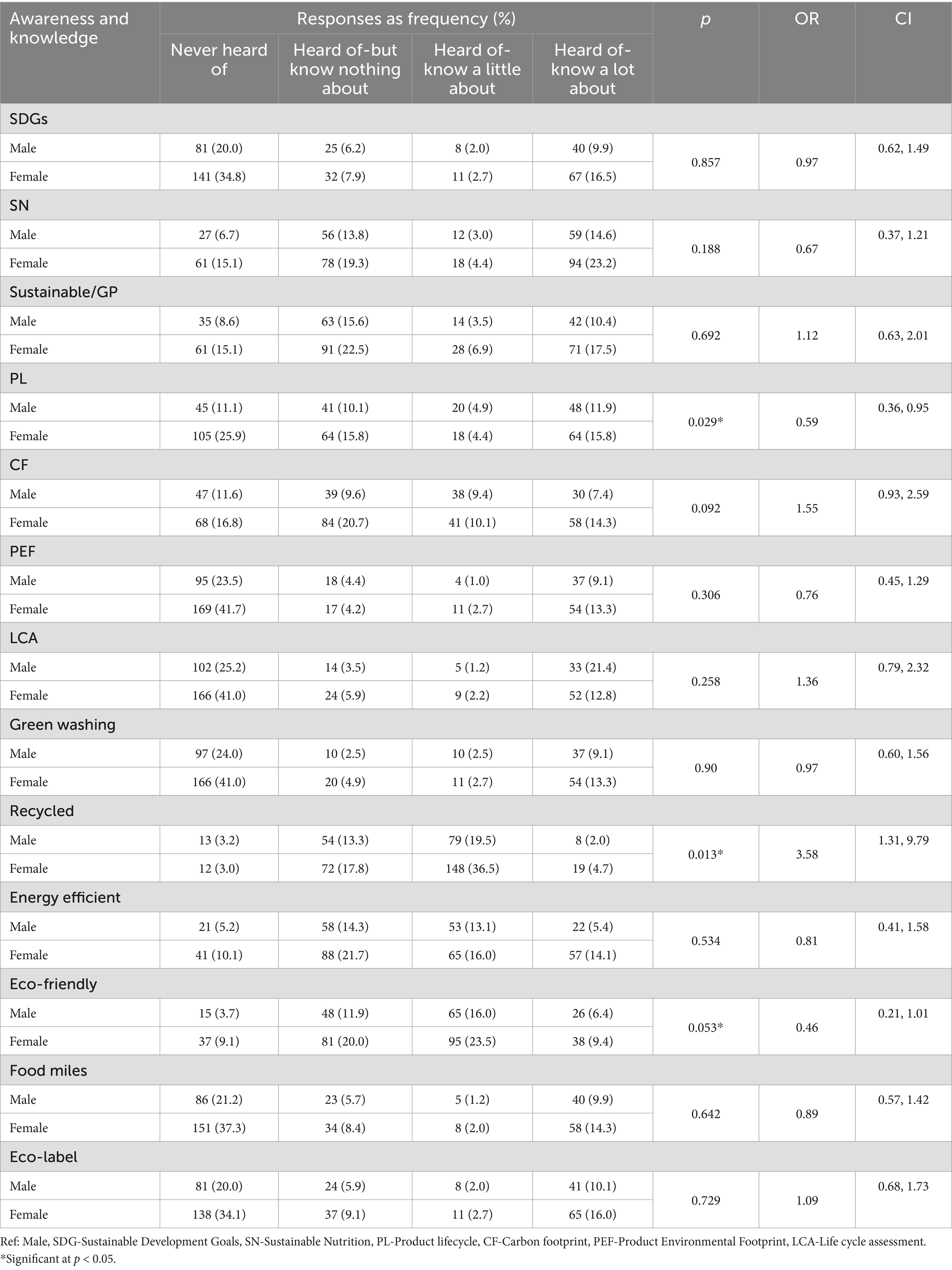
Table 3. Awareness and knowledge of sustainable food and nutrition terms among male and female respondents.
A significant proportion showed that they did not know product environmental footprint (65.2%, n = 264), LCA (66.2%, n = 268), green-washing (64.9%, n = 263), food miles (58.5%, n = 237) and eco-label (54.1%, n = 219) (p < 0.001). The proportion of respondents who have heard of the terms “recycled,” “energy-efficient,” “eco-friendly,” and “carbon footprint” were 56.0% (n = 227), 29.1% (n = 118), 39.5% (n = 160) and 19.5% (n = 79), respectively. A significant proportion of respondents, 62% (n = 251) knew what the term ‘sustainability’ meant, and the remaining 38% (n = 154) did not (p < 0.001) (Figure 1). The respondents understanding of “sustainability” was assessed using various research articles.
In comparing females to males on awareness and knowledge of terms related to sustainable food and nutrition, significant differences were found between females and males in awareness and knowledge of “product lifecycle,” “recycle” and “eco-friendly.” The proportion of females (25.9%) who had never heard of “product lifecycle” before was significantly higher than that of male respondents (11.1%), p = 0.029. Females were 0.59 times likely not to have heard about “product lifecycle” before (OR = 0.59, CI: 0.36, 0.95). Likewise, the proportion of females (36.5%) who heard but knew little about “recycle” was significantly higher than that of males (19.5%), p = 0.013. Females were 3.58 times less likely to know about recycling as much as males (OR = 3.58, CI: 1.31, 9.79). Furthermore, the proportion of females (20.0%) who knew nothing about “eco-friendly” was significantly higher than males (11.9%), p = 0.053.
3.3 Respondents’ sources of information about environmentally friendly foods
Figure 2 shows the sources of information about environment-friendly foods among respondents. A significant number (77.3%) of the respondents relied on the Internet as the primary source of information about foods (p < 0.001). In comparison, 50.6, 32.6 and 31.4% obtained information from their social community (university peers), other sources (such as relatives) and university curriculum, respectively.
3.4 Attitudes and practices towards sustainable nutrition and environment
Tables 4–6 presents results on respondents’ attitude and practices towards sustainable nutrition and environment. Findings showed that only 18.0% of respondents frequently checked if the packaging of the product they purchase is recyclable or reusable. Less than one-third (23.6%) used their own shopping bag when shopping. Respondents who had the habit of reading the information on the product label regularly were 35.1%. The proportion of those who usually bought local products was 37.1%, while those who paid attention to where their foods are produced or grown were 23.0%. Just over a quarter of respondents purchased foods in season (28.2%). Approximately, 36.8% of the respondents noted that they never substitute meat with more sustainable vegetarian options. In comparison, 32.6% rarely looked for any eco-label on the packaging to evaluate a product, 30.9% seldom cared if the products they bought were environmentally friendly, and 29.4% seldom paid attention to where the food was produced or grown.
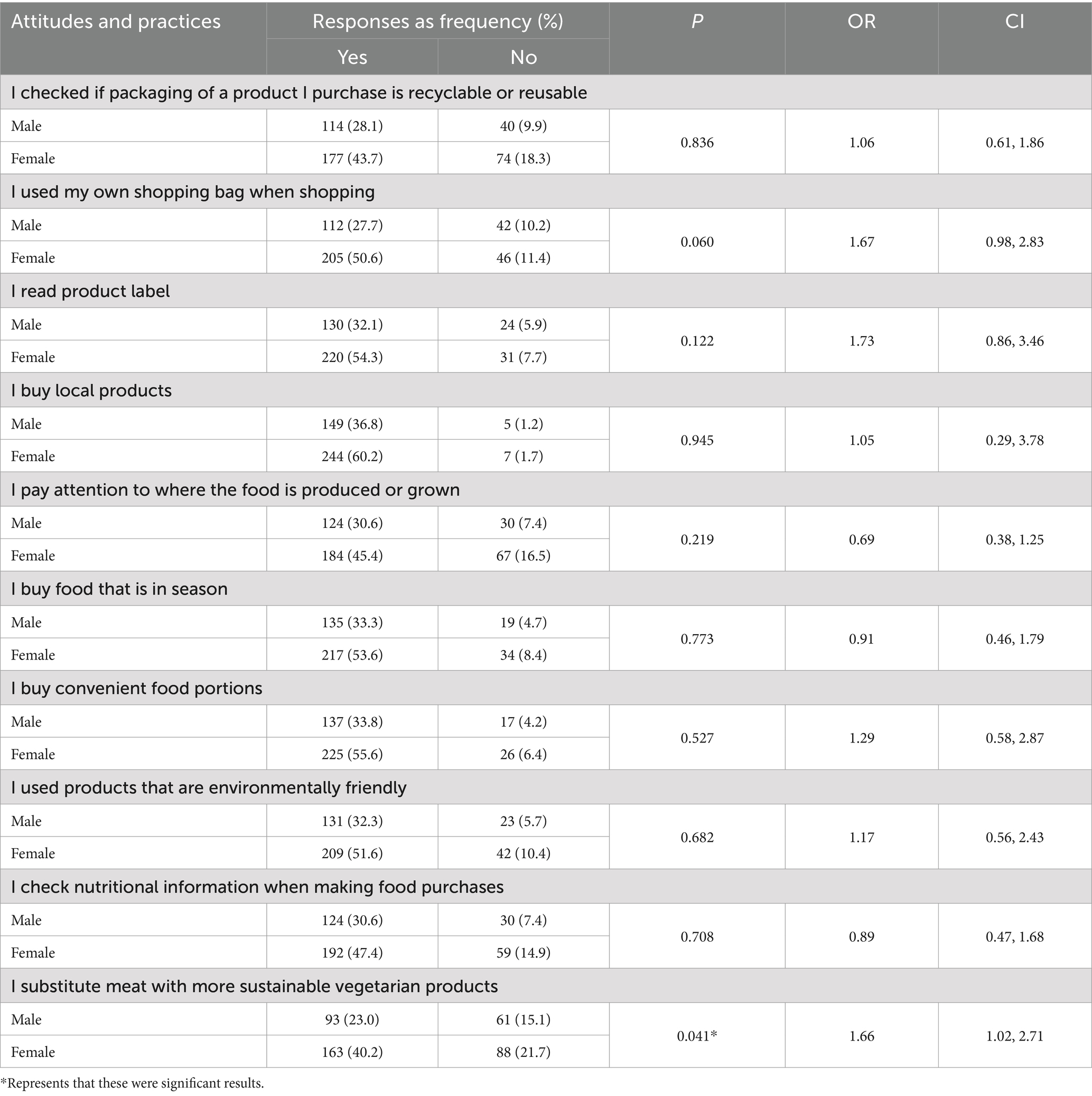
Table 5. Attitudes and practices of food and nutrition sustainability among male and female respondents.
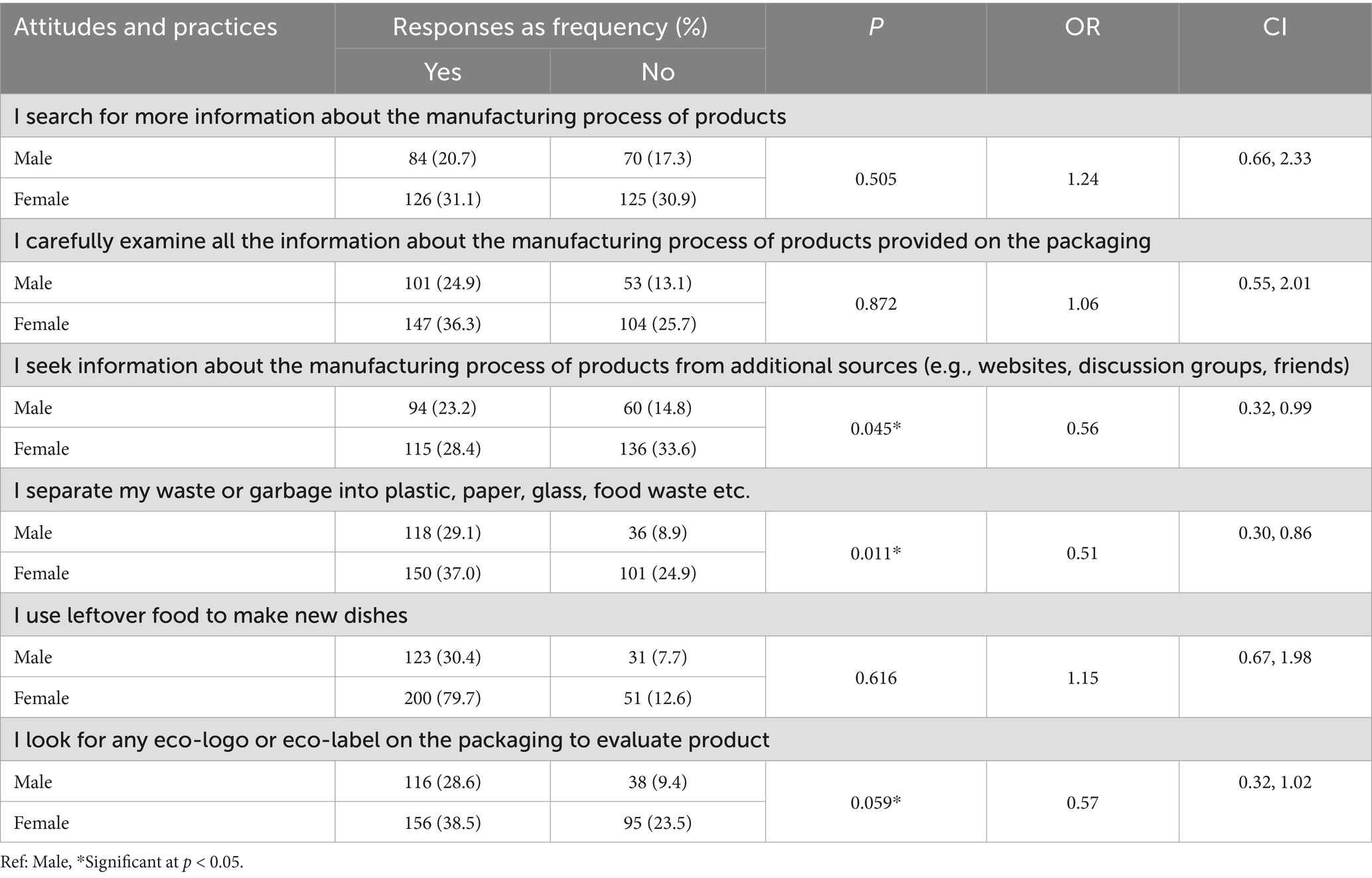
Table 6. Attitudes and practices of food and nutrition sustainability among male and female respondents.
More than one-third (48.4%) of the respondents never sought information about the manufacturing process of products from additional sources, 48.1% of respondents never searched for more information about the manufacturing process of products, and 38.8% never carefully examined all the information about the manufacturing process of products provided on the packaging. Those who sought information about the manufacturing process of products from additional sources (such as websites, discussion groups, and friends) were 10.6%. In comparison, 26.2% usually separated their waste or garbage into plastic, paper, and glass. The proportion of those who regularly “used leftover food to make new dishes” was 39.5%.
In comparing male to female respondents, proportions of females who never had any of the attitudes nor performed any practice towards any of the sustainable nutrition and environment were more than those of males. The significant differences were found in attitudes and practices towards substitute meat with more sustainable vegetarian products (15.1% males, 21.7% females, p = 0.041), seeking information about the manufacturing process of products from additional sources (14.8% males, 33.6% females, p = 0.045), separating waste or garbage into plastic, paper, glass, food waste (8.9% males, 24.9% females, p = 0.011) and looking for any eco-logo or eco-label on the packaging to evaluate product (9.4% males, 23.5% females, p = 0.059). Females were 1.66, 0.56, 0.51 and 0.57 times less likely to substitute meat with more sustainable vegetarian products (OR = 1.66, CI: 1.02, 2.71), to seek information about the manufacturing process of products from additional sources, to separate my waste or garbage into plastic, paper, glass, food waste and to look for any eco-logo or eco-label on the packaging to evaluate product than males, respectively.
3.5 Drivers of food choices among respondents
Table 7 presents factors that respondents consider barriers and drivers of food choices. Regarding these factors, affordability ranked the highest (5.04 ± 1.64). This was followed by biodegradable or compostable packaging (4.38 ± 1.50) and low food waste production during processing (4.27 ± 1.57). Other influential factors included products made by companies that respect employees’ social rights (4.18 ± 1.67) and those that support biodiversity with low environmental impact (4.14 ± 1.61).
Cultural acceptability (3.92 ± 1.64), plant-based characteristics (3.72 ± 1.63), and organic attributes (3.93 ± 1.49) also played a role in food choices. Additionally, locally produced foods (3.90 ± 1.53), seasonality (3.80 ± 1.46), and simplicity in food additives and processing (3.93 ± 1.62) were considered important. Most drivers of the food choices were of similar importance, with affordability ranked the highest. The rest of the drivers also played key roles in shaping food choices.
3.6 Barriers to healthy food choice
A notable 29.6% of respondents indicated that they found it challenging to avoid unhealthy options, and 25.4% noted that the cost of healthier foods makes it unaffordable for them to maintain a healthy diet (Table 8). The proportion of respondents who indicated they faced obstacles when adhering to a healthy diet was 45%. These include the following: “I do not need to eat healthy/my diet is already healthy,” “I find it difficult to avoid unhealthy options,” “my mood makes it difficult to eat a healthier diet,” or “I find it difficult to eat healthy because I have no say on what type of foods are bought at home”.
4 Discussion
In fulfilling the 2030 SDGs among young adults, there is a need to create transformative ideas for sustainability, climate change goals, and enhanced health at the student level. The demographic profile of the study respondents was representative of the university population, and the racial diversity of the respondents presented the multi-ethnic nature of South Africa.
This study found a low level of knowledge and a lack of awareness about SDGs among the study respondents, and the level of knowledge of sustainable food and nutrition. Other researchers have also reported earlier that there is a lack of awareness and adequate knowledge of sustainable nutrition issues among young adults (Rieckmann et al., 2017; García-González et al., 2020). However, knowledge of food and nutrition sustainability is important for university students as they navigate a transitional stage of life. In this critical phase, dietary habits are formed, and health outcomes are established (Li et al., 2023). During this period, youth frequently face unique challenges such as financial constraints, demanding schedules, and dependence on convenience foods, which could result in poor nutritional outcomes (Contini et al., 2020). South Africa has been found to have a high rate of overweight and obesity among young adults, and predisposing factors to these menaces include a sedentary lifestyle and socioeconomic factors (Nwosu et al., 2022). However, the current study shows that a lack of knowledge of healthy foods among young adults contributes to unhealthy food choices and increases the rate of obesity reported among South African youths.
The findings of this study show that the attitudes and practices towards healthy foods among university students in the study location were poor. Many university students consume diets that lack essential nutrients such as vitamins and minerals (Almoraie et al., 2021). Many students choose to consume calorie-dense foods characterised by sugar, fat and salt. Examples include fast food, processed snacks and sugary beverages (Almoraie et al., 2021). The limited availability of nutritious food options within the campus environment further intensifies these issues. Furthermore, time constraints or resources contribute to many university students frequently skipping meals and resorting to eating fast food during free periods. However, energy imbalances and nutritional shortages that adversely affect students ‘academic performance have been reported because of this lifestyle (Merhy et al., 2023; Viljoen et al., 2018).
In addition, embracing sustainable food practices will allow students to prioritise their health while also being mindful of the environmental impact of their dietary choices. Against the option of many study respondents, opting for local and seasonal produce will enhance their diet to be fresh, and more nutrient-dense foods. This action will also support local farmers in cultivating indigenous foods. Thereby, carbon emissions associated with long-distance food transportation will be reduced in South Africa (Nakajima, 2022).
Furthermore, university campuses are suitable for promoting sustainability programmes through dining services and making healthy and sustainable food options accessible to students (Doherty, 2022). Many institutions are now adopting practices such as sourcing food from local farms, offering plant-based meal choices, and reducing food waste through composting and donation initiatives (Leal Filho et al., 2023). These efforts promote a culture of sustainability on campus and educate students about the significance of making informed food choices (Meijer et al., 2023). By participating in such programmes, students can build habits that lead to long-term health while advocating for environmental concerns within their communities (Ramzan et al., 2023).
Parts of the predisposing factors that have been identified to influence students’ food choices in tertiary institutions include taste, convenience, daily living activities, price, sensory appeal and mood (Petre and Mirea, 2023; Malambe et al., 2021). However, this study found affordability, biodegradable compostable packaging, food waste production, biodiversity support, cultural acceptability, plant-based characteristics and organic attributes as key factors that motivate food choices, while the cost of food and parental influence on meal preparation serve as barriers to food choice of the study respondents.
Moreover, awareness of the SDGs can tremendously impact food choice and the environment. This would lead to reduced hunger, responsible consumption, environment-friendly food preparation and biodiversity conservation (Verain et al., 2021). This study has shown that awareness of food and nutrition sustainability is low among young educated adults in South Africa. This is reflected in their attitudes and practices towards sustainable nutrition and the environment, as many of the university students made food choices based on convenience, were not concerned about where food is produced, nor did they recycle the packaging materials they used.
Therefore, there is a need to increase awareness of food and nutrition sustainability to enable university students to act as advocates for change within and beyond campus (Fretes et al., 2021). Participating in sustainability efforts, such as campus gardens dedicated to food security, could encourage students to develop leadership skills and build a community spirit to promote a healthy dietary lifestyle (Mittal and Bansal, 2024). If Food and Nutrition students understand the links between food systems, public health, and environmental concerns, they are better prepared to support policies and actions that encourage sustainability (Wood et al., 2023). This comprehensive awareness may motivate future leaders across different sectors to emphasise sustainability in both their personal and professional lives, ultimately aiding in a more sustainable future for all.
Universities are uniquely positioned to take a lead in implementing policies that increase access to affordable and nutritious foods. For example, the University of Lethbridge’s food initiative effectively combined food literacy with practical support measures, such as subsidised meals and on-campus food pantries to address student food insecurity (Sept, 2024). Similarly, the Food Boost Challenge exemplifies the impact of participatory action research, where youth-led strategies successfully promoted healthier dietary behaviors among adolescents (Van Lieshout et al., 2023). Food hubs in Leeds further demonstrate the benefits of cross-sector collaboration in strengthening local food systems and promoting sustainable consumption (Papargyropoulou et al., 2024).
These examples underscore the potential of partnerships, incentives, and student-led initiatives to promote sustainable habits within campus environments. Educational institutions must empower students as proactive agents of sustainable transitions. Initiatives such as community gardens, food cooperatives, and climate-smart markets enable students to engage directly with sustainability practices while simultaneously reinforcing theoretical knowledge acquired within academic settings (Egan Sjölander, 2021; Department of Education (DBE), 2025). Embedding these programs within the framework of campus branding and institutional culture can position universities as pioneers in climate accountability and food justice, aligning with contemporary trends in place branding that prioritise sustainability. Future research should focus on long-term assessments of these interventions.
Furthermore, interdisciplinary research connecting local journalism, student participation, and climate communication, as examined in “Local Journalism and Climate Change in Sweden,” could enhance the visibility and influence of sustainable food narratives on campus and beyond (Egan Sjölander, 2021). Through such approaches, higher education institutions can play a pivotal role in shaping a more sustainable and equitable food environment for future generations.
5 Conclusion
This study highlights a lack of awareness and understanding of the Sustainable Development Goals (SDGs) among South African young adults, a gap that exacerbates the prevalence of unsustainable and unhealthy food choices. Addressing this concern through enhanced consumer education is imperative to promote greater awareness of the environmental, social, and economic consequences associated with food choice. Empowering university students with this knowledge will enable them to make informed food decisions with sustainability objectives. A resilient and responsive food system is crucial in addressing climate change challenges, and sustainable and healthy food production and consumption must be prioritised to reduce environmental impact while ensuring nutritional adequacy. To support healthier and more sustainable food choices, universities should implement policies that improve access to affordable and nutritious foods.
6 Limitations of the study
While this study provides valuable insights into food and nutrition sustainability, knowledge, and dietary habits among university students, limitations are noted. Data was collected from a single geographical location in Durban, KwaZulu-Natal. This may constrain the generalisability of the findings to other regions or institutions with different socio-economic and cultural contexts. Additionally, the study’s cross-sectional design captures only a point in time, limiting the ability to assess long-term students’ behavioral changes. Future research would benefit from encompassing longitudinal methods and expanding the sample to include a more diverse range of universities and student populations across South Africa and beyond.
7 Strengths of the study
The study findings underscore the urgent need for targeted educational interventions to bridge the knowledge gap and empower young adults to make informed, sustainable food choices. This study also contributes to a deeper understanding of the context of food and nutrition sustainability among university students. Beyond its relevance to sustainability, it offers critical insights into the dietary status of students, which is an area of growing concern within the context of higher education in South Africa. Notably, this is the first known study conducted in the South African higher education sector, addressing an overlooked yet significant gap in the existing literature.
Data availability statement
The original contributions presented in the study are included in the article/Supplementary material, further inquiries can be directed to the corresponding author.
Ethics statement
The studies involving humans were approved by DUT Institutional Research Ethics Committee (IREC 102/23). The studies were conducted in accordance with the local legislation and institutional requirements. The participants provided their written informed consent to participate in this study.
Author contributions
SS: Writing – original draft, Writing – review & editing. AN: Supervision, Writing – review & editing. OM: Supervision, Writing – review & editing. OO: Supervision, Writing – review & editing.
Funding
The author(s) declare that financial support was received for the research and/or publication of this article. The FoodBev SETA Grant funded the research. The funder played no role in study design, in the collection, analysis, and interpretation of the data, in the writing of the report, or in the decision to submit for publication.
Acknowledgments
We want to thank all students at DUT who participated in the study.
Conflict of interest
The authors declare that the research was conducted in the absence of any commercial or financial relationships that could be construed as a potential conflict of interest.
Generative AI statement
The author(s) declare that no Gen AI was used in the creation of this manuscript.
Publisher’s note
All claims expressed in this article are solely those of the authors and do not necessarily represent those of their affiliated organizations, or those of the publisher, the editors and the reviewers. Any product that may be evaluated in this article, or claim that may be made by its manufacturer, is not guaranteed or endorsed by the publisher.
Supplementary material
The Supplementary material for this article can be found online at: https://www.frontiersin.org/articles/10.3389/fsufs.2025.1589413/full#supplementary-material
References
Ahmad, S., Wong, K. Y., and Ahmad, R. (2019). Life cycle assessment for food production and manufacturing: recent trends, global applications and future prospects. Proc. Manufact. 34, 49–57. doi: 10.1016/j.promfg.2019.06.113
Almoraie, N. M., Saqaan, R., Alharthi, R., Alamoudi, A., Badh, L., and Shatwan, I. M. (2021). Snacking patterns throughout the life span: potential implications on health. Nutr. Res. 91, 81–94. doi: 10.1016/j.nutres.2021.05.001
British Dietetic Association. (2022). Sustainable diets. Available online at: https://www.bda.uk.com/food-health/your-health/sustainable-diets.html (Accessed 28 March 2023).
Contini, C., Boncinelli, F., Marone, E., Scozzafava, G., and Casini, L. (2020). Drivers of plant-based convenience foods consumption: results of a multicomponent extension of the theory of planned behaviour. Food Qual. Prefer. 84:103931. doi: 10.1016/j.foodqual.2020.103931
Crippa, M., Solazzo, E., Guizzardi, D., Monforti-Ferrario, F., Tubiello, F. N., and Leip, A. (2021). Food systems are responsible for a third of global anthropogenic GHG emissions. Nat. Food 2, 198–209. doi: 10.1038/s43016-021-00225-9
Curran, M. A. (2013). Life cycle assessment: a review of the methodology and its application to sustainability. Curr. Opin. Chem. Eng. 2, 273–277. doi: 10.1016/j.coche.2013.02.002
Dell’Anna, F., Pederiva, G., Vergerio, G., Becchio, C., and Bottero, M. (2023). Supporting sustainability projects at neighbourhood scale: green visions for the san Salvario district in Turin guided by a combined assessment framework. J. Clean. Prod. 384:135460. doi: 10.1016/j.jclepro.2022.135460
Department of Education (DBE). (2025). DBE urges PEDs to sustain School Food Garden initiative. Available online at: https://www.education.gov.za/SchoolFoodGardens.aspx (Accessed 23 April 2025).
Doherty, H. M. (2022). The effect of income on healthy food options. Underg. Econ. Rev. 18:8. Available online at: https://digitalcommons.iwu.edu/uer/vol18/iss1/8
Egan Sjölander, A. (2021). Agents of sustainable transition or place branding promotor?: local journalism and climate change in Sweden. Nordic J. Media Stud. 3, 20–39. doi: 10.2478/njms-2021-0002
Fretes, G., Sepúlveda, A., Corvalán, C., and Cash, S. B. (2021). Children’s perceptions about environmental sustainability, food, and nutrition in Chile: a qualitative study. Int. J. Environ. Res. Public Health 18:9679. doi: 10.3390/ijerph18189679
García-González, Á., Achón, M., Carretero Krug, A., Varela-Moreiras, G., and Alonso-Aperte, E. (2020). Food sustainability knowledge and attitudes in the Spanish adult population: a cross-sectional study. Nutrients 12:3154. doi: 10.3390/nu12103154
Horn, B., Ferreira, C., and Kalantari, Z. (2022). Links between food trade, climate change and food security in developed countries: A case study of Sweden. Dordrecht, Netherlands: Ambio, 934–954.
Kent, K., Visentin, D., Peterson, C., Primo, C., Elliott, C., Otlowski, M., et al. (2021). The perceived importance and intended purchasing patterns of sustainable foods in Australian university students. Sustain. For. 13:11928. doi: 10.3390/su132111928
Leal Filho, W., Ribeiro, P. C. C., Setti, A. F. F., Azam, F. M. S., Abubakar, I. R., Castillo-Apraiz, J., et al. (2023). Toward food waste reduction at universities. Environ. Dev. Sustain. 26, 16585–16606. doi: 10.1007/s10668-023-03300-2
Li, B., Tang, X., and Le, G. (2023). Dietary habits and metabolic health. Nutrients 15:3975. doi: 10.3390/nu15183975
Malambe, L. S., Meyer-Weitz, A., and Makhakhe, N. (2021). An exploration of factors that influence food choices among students of the University of KwaZulu-Natal, Howard College campus. Durban, SouthAfrica: University of KwaZulu-Natal, SouthAfrica.
Meijer, G. W., Grunert, K. G., and Lähteenmäki, L. (2023). Chapter seven: supporting consumers' informed food choices: sources, channels, and use of information. Adv. Food Nutr. Res. 104, 229–257. doi: 10.1016/bs.afnr.2022.10.005
Merhy, G., Moubarak, V., Hallit, R., Obeid, S., and Hallit, S. (2023). The indirect role of orthorexia nervosa and eating attitudes in the association between perfectionism and muscle dysmorphic disorder in Lebanese male university students: results of a pilot study. BMC Psychiatry 23:55. doi: 10.1186/s12888-023-04549-7
Mittal, P., and Bansal, R. (2024). Community engagement for sustainable practices in higher education: From awareness to action. Cham: Palgrave Macmillan.
Morganti, P., Gao, X., Vukovic, N., Gagliardini, A., Lohani, A., and Morganti, G. (2022). Food loss and food waste for green cosmetics and medical devices for a cleaner planet. Cosmetics 9:19. doi: 10.3390/cosmetics9010019
Mthembu, T. (2023). State of University Address (online video). Available online at: https://www.youtube.com/watch?v=4WDAz4kBs_o (Accessed 12 March 2023).
Nakajima, M. (2022). Sustainable food consumption: demand for local produce in Singapore. Sustain. For. 14:12330. doi: 10.3390/su141912330
Nwosu, E., Fismen, A. S., Helleve, A., Hongoro, C., Sewpaul, R., Reddy, P., et al. (2022). Trends in prevalence of overweight and obesity among south African and European adolescents: a comparative outlook. BMC Public Health 22:2287. doi: 10.1186/s12889-022-14724-2
Papargyropoulou, E., Bridge, G., Woodcock, S., Strachan, E., Rowlands, J., and Boniface, E. (2024). Impact of food hubs on food security and sustainability: food hubs perspectives from Leeds, UK. Food Policy 128:102705. doi: 10.1016/j.foodpol.2024.102705
Petre, A. A., and Mirea, I. A. (2023). “Factors influencing food choice among Romanian university students,” in Foodscapes: Theory, history, and current European examples. (eds.) O. Kühne, J. D. Fischer, T. Sedelmeier, V. Hochschild, B. Staniscia, and C. Manetti, et al. (Wiesbaden: Springer Fachmedien Wiesbaden), 121–135.
Petrescu, D. C., Vermeir, I., and Petrescu-Mag, R. M. (2020). Consumer understanding of food quality, healthiness, and environmental impact: a cross-national perspective. Int. J. Environ. Res. Public Health 17:169. doi: 10.3390/ijerph17010169
Poore, J., and Nemecek, T. (2018). Reducing foods environmental impacts through producers and consumers. Science 360, 987–992. doi: 10.1126/science.aaq0216
Ramzan, M., Ullah, S., Raza, S. A., and Nadeem, M. (2023). A step towards achieving SDG 2030 agenda: analyzing the predictive power of information globalization amidst technological innovation-environmental stewardship nexus in the greenest economies. J. Environ. Manag. 335:117541. doi: 10.1016/j.jenvman.2023.117541
Ranganathan, J., Waite, R., Searchinger, T., and Hanson, C. (2018). How to sustainably feed 10 billion people by 2050, in 21 charts. Available online at: https://www.wri.org/insights/how-sustainably-feed-10-billion-people-2050-21-charts?utm_campaign=socialmedia&utm_source=twitter.com&utm_medium=worldresources&utm_content=bloggraphic (Accessed 30 March 2023).
Rieckmann, M., Mindt, L., Gardiner, S., Leicht, A., and Heiss, J. (2017). Education for sustainable development goals: learning objectives. Paris: UNESCO.
Ruiz-Blanco, S., Romero, S., and Fernandez-Feijoo, B. (2022). Green, blue or black, but washing–What company characteristics determine greenwashing?. Environ. Dev. Sustain. 24, 4024–4045. doi: 10.1007/s10668-021-01602-x
Sept, M. (2024). Campus food initiatives and student food insecurity on the University of Lethbridge Campus. Eur. Secur. 9, 1–7. doi: 10.29173/eureka28802
Sirieix, L., Grolleau, G., and Schaer, B. (2008). Do consumers care about food miles? An empirical analysis in France. Int. J. Consum. Stud. 32, 508–515. doi: 10.1111/j.1470-6431.2008.00711.x
Statistics South Africa. (2019). SA population reaches 58,8 million. Available online at: https://www.statssa.gov.za/?p=12362 (Accessed 11 April 2023).
Stratton, S. J. (2021). Population research: convenience sampling strategies. Prehosp. Disaster Med. 36, 373–374. doi: 10.1017/S1049023X21000649
Taherdoost, H. (2017). Determining sample size: how to calculate survey sample size. Int. J. Econ. Manag. Syst. 2, 237–239. Available at: https://ssrn.com/abstract=3224205
Van Lieshout, M., Scholtes-Bos, W., Van der Horst-Graat, J. M., Van Holsteijn, P., and De Vries, S. I. (2023). Development of the food boost challenge: a participatory action research approach to enhance vegetable and fruit consumption among adolescents. Nutrients 15:4921. doi: 10.3390/nu15234921
Verain, M. C. D., Snoek, H. M., Onwezen, M. C., Reinders, M. J., and Bouwman, E. P. (2021). Sustainable food choice motives: the development and cross-country validation of the sustainable food choice questionnaire (SUS-FCQ). Food Qual. Prefer. 93:104267. doi: 10.1016/j.foodqual.2021.104267
Viljoen, A. T., van der Spuy, E., and du Rand, G. E. (2018). Food consumption, lifestyle patterns, and body mass index of a group of white south African students. Int. J. Consum. Stud. 42, 533–546. doi: 10.1111/ijcs.12465
Keywords: sustainability, food choice drivers, knowledge, awareness, attitudes, university students
Citation: Sahadeo S, Naicker A, Makanjana O and Olaitan OO (2025) Awareness, knowledge and attitudes of food and nutrition sustainability, and food choice drivers among university students. Front. Sustain. Food Syst. 9:1589413. doi: 10.3389/fsufs.2025.1589413
Edited by:
Olutosin Ademola Otekunrin, University of Ibadan, NigeriaReviewed by:
Shreya Some, Technical University of Denmark, DenmarkSharifa Alblooshi, Zayed University, United Arab Emirates
Paul-Emmanuel Ossom Ossom, Girne American University, Cyprus
Adeline Lanham, Queensland University of Technology, Australia
Copyright © 2025 Sahadeo, Naicker, Makanjana and Olaitan. This is an open-access article distributed under the terms of the Creative Commons Attribution License (CC BY). The use, distribution or reproduction in other forums is permitted, provided the original author(s) and the copyright owner(s) are credited and that the original publication in this journal is cited, in accordance with accepted academic practice. No use, distribution or reproduction is permitted which does not comply with these terms.
*Correspondence: Sanrika Sahadeo, MjE4MDQ3MDFAZHV0NGxpZmUuYWMuemE=
 Sanrika Sahadeo
Sanrika Sahadeo Ashika Naicker
Ashika Naicker
